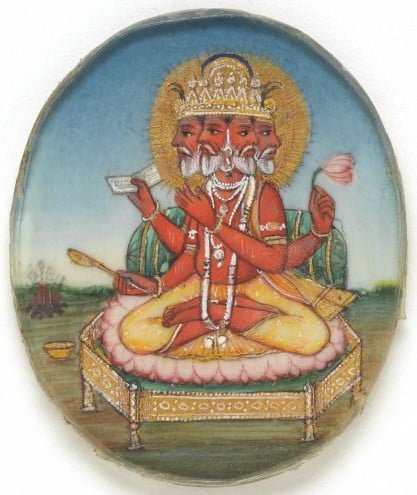Who is the Hindu god of creation?
In the age of science, you need not believe anything unless it is rational and presented with valid evidence, having said that all religious texts which talk about god and creation are myths.
The word Hindu is a recent word associated with the Vedic religion in the Indian subcontinent, which is also called Sanatan Dharma from ancient times.
How do Vedanta and Hinduism deal with the subject “Hindu God of Creation”?
Remember only Vedanta says do not believe in anything unless you have reviewed and internalized it and got clarified by a Guru with a standard process of Logic with inferences and evidence.
Hinduism is the most diversified because of this openness allowed to all followers and in this process of open thinking developed and people wrote a lot of mythology which is embedded with known science at that time.
Why is mythology required to explain something?
Humans have a habit of peddling the ideologies they believe for various reasons like good intentions, self-gratification, to control the masses, and for political power and management of the masses, and to reach the masses you need to rely on mythology, hence ancients created mythology, however in this process, there is a risk of false ideologies being propagated, however, ancient Hindus took care of this by embedding mythology embedded with ethics and morals.
The Foundation of Hinduism is Vedanta, which mentions the Hindu God of creation below
The god of creation is known as Ishvara. Ishvara is the supreme being, the creator and sustainer of the universe. Ishvara is also the source of all knowledge and power.
Vedanta teaches that Ishvara is both transcendent and immanent. Transcendent means that Ishvara is beyond the universe and cannot be fully known by human beings. Immanent means that Ishvara is present in the universe and can be experienced through meditation and other spiritual practices.
Vedanta teaches that the goal of human life is to achieve moksha, or liberation from the cycle of birth and death. Moksha can be achieved through knowledge of Ishvara and through the practice of selfless service.
Here are some of the key verses from the Upanishads that mention Ishvara:
“The Self is the inner controller, the witness, the enjoyer, the supreme abode, the source of all, the refuge of all, the protector, the imperishable. This Self is Brahman.” (Brihadaranyaka Upanishad 3.7.23)
“The wise man should worship the one God, who is hidden in all beings, who is the inner controller, who is the witness, who is the enjoyer, and who is the supreme abode.” (Chandogya Upanishad 3.14.1)
“The one who knows Brahman is free from fear. The one who knows Brahman is free from sorrow. The one who knows Brahman is free from grief.” (Katha Upanishad 2.2.14)
The later explanations of the “Hindu God of creation” as per Hindu mythology are given below.
Brahma created the universe out of nothing, as mentioned by science today, He used his own divine powers to create everything we see around us today. The story of creation goes something like this: Brahma created the universe by first creating the cosmic ocean and then continued to create the rest of the universe.
The Hindu religion also believes in the concept of cycles of creation and destruction. Brahma is said to create the universe at the beginning of each cycle, and then destroy it at the end. This cycle is said to repeat itself endlessly, which means that creation and destruction are ongoing processes in the universe.
The concept of time in Hinduism is also fascinating. According to Hindu beliefs, time is cyclical, just like the universe. Time is divided into four ages or yugas. These yugas are known as the Satya Yuga, Treta Yuga, Dvapara Yuga, and Kali Yuga. The Satya Yuga is considered to be the most virtuous age, while the Kali Yuga is considered to be the most chaotic.
